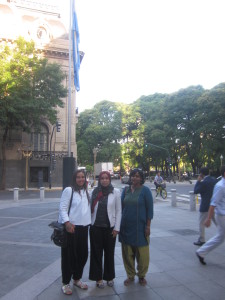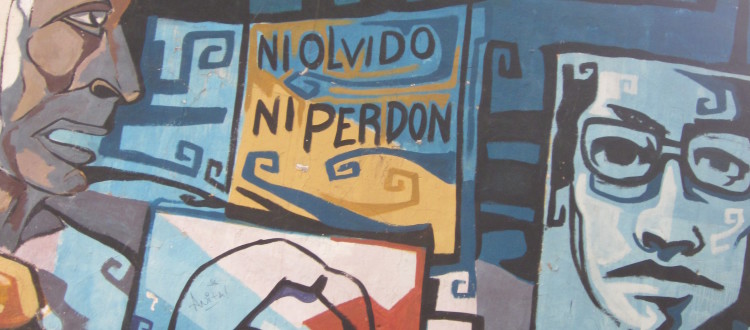South-South Transitional Justice Learning: Egypt, Sri Lanka & Argentina
 Cecilia organised and facilitated an innovative South-South learning and research exchange in Buenos Aires, Argentina: the aim was to learn and reflect on the process of transitional justice, reconciliation and memory in Argentina by meeting the most important stakeholders driving the transition process since the 80′ and until today.
Cecilia organised and facilitated an innovative South-South learning and research exchange in Buenos Aires, Argentina: the aim was to learn and reflect on the process of transitional justice, reconciliation and memory in Argentina by meeting the most important stakeholders driving the transition process since the 80′ and until today.
The exchange will inform the Egyptian and Sri Lankan transitional process and that we will be able too open up new ways for mutual cooperation as these two countries move towards justice and reconciliation after dictatorship and wars.
We will document and disseminate key learnings with organizations, governments and universities in the Global South and North.
The group is composed by Cecilia Milesi (Argentina), Bhavani Fonseka (Sri Lanka) and Amal Muktar (Egypt)
More news soon on each one our excellent meetings. Below information on our work in these areas and the organisations we are representing.
Egypt: Amal Mukhtar
Amal is the Head of Research for Civil Society and Human Rights Al-Ahram Center for Political and Strategic Studies (ACPSS) of Cairo, Egypt ((http://acpss.ahram.org.eg ). Amal has fifteen years of experience as a political researcher. She has published numerous articles, studies on their areas of interest: transitional justice, national reconciliation, negotiation and peace building. Amal is coordinating a research and political influence on transitional justice and reconciliation in Egypt. In December 2014 ACPSS submit recommendations to the Egyptian parliament to strengthen the process of democratization.
ACPSS: ACPSS was established in 1968 and is one of the leading think tanks in Egypt and the region, committed to independent research and critical thinking. ACPSS enjoys unrivalled reach and has been ranked among the top 30 research centres in the world, and the first one in the Middle East and North Africa in the Global “Go-To Think Tanks” produced annually by the University of Pennsylvania (USA).
• Sri Lanka: Bhavani Fonseka
Bhavani is a lawyer and senior researcher at Human Rights Centre for Policy Alternatives (CPA-(http://www.cpalanka.org/ ), a “think tank” based in Colombo, Sri Lanka.
Bhavani has worked on issues related to the rule of law, human rights and humanitarian crisis in Sri Lanka for more than a decade. She has litigated several historical cases filed in the Supreme Court of Sri Lanka and the Court of Appeal challenging the constitutional amendments, arbitrary laws and practices for the protection of various communities affected by the conflict in Sri Lanka. She is also involved with advocacy of civil society in both the United Nations Human Rights Council, which led to the adoption of agreements on accountability and reconciliation in Sri Lanka in 2012, 2013 and 2014, this finally resulting in the creation of an investigation into human rights violations in Sri Lanka within the Office of the High Commissioner for Human rights (OHCHR). Her current work focuses on the debates and methods of restorative and retributive justice and transitional justice in Sri Lanka. She is also overseeing the work of state initiatives that investigate human rights violations in Sri Lanka, including the Presidential Commission on Missing Persons currently holding public meetings in the north and east. Bhavani has an LLB (Hons.) (Bristol), LLM (Denver) and AMP (Harvard). She was one of Asia 21 Fellow and Richard C. Holdbrooke Fellow of the Asia Society, USA and more recently, a Mason Fellow at Harvard Kennedy School of Government. Bhavani writes regularly at one of the sites online “Groundviews” (http://groundviews.org), one of the most respected in the country.
Centre for Policy Alternatives (CPA): is one of the most important “Think Tanks” in Sri Lanka focused on research and development in the areas of governance, peace and human rights. CPA was formed in the firm belief that there is an urgent need to strengthen the institution and capacity building for good governance and conflict transformation in Sri Lanka, whereas nonpartisan civil society groups have an important and constructive role to play. The primary role envisaged for the CPA in the field of public policy is a pro-active approach for dissemination and advocacy of policy alternatives for non-violent conflict resolution and democratic governance.
• Argentina: Cecilia Milesi
Cecilia is a specialist in international conflict transformation, public policies and civil society participation in change processes promoting economic, social justice, dialogue and citizens’ participation.
Cecilia has over 18 years’ experience in building and supporting change in the South and the Global North, holding leadership and advisory roles in organizations such as Amnesty International (International Secretariat, London), Conciliation Resources (UK) Oxfam (global), Subir al Sur (Argentina), SES Foundation (Argentina), Synergos (NY), among others. Cecilia works in countries and with community leaders in Latin America, Africa, Asia and Europe. Cecilia is a member of Somaliland Focus UK and supports the peace process in this unrecognised country, especially participating in elections. In 2014, Cecilia was selected as a Fellow of the Global South Unit for Mediation (Mediation Unit of the Global South) BRICS Policy Center, Brazil where she researched and taught on citizen participation in peace processes, including case studies of Somaliland, the Philippines and Colombia (http://bricspolicycenter.org/homolog/Projetos/Interna/143).
Cecilia is a sociologist (University of Buenos Aires), has a degree in Anthropology and Social Development (FLACSO) and a Masters in Violence, Conflict and Development (University of London, SOAS). More information: www.ceciliamilesi.com
Español
Estoy organizando y facilitando un proyecto innovador de aprendizaje e investigación intercambio Sur-Sur en Buenos Aires, Argentina: el objetivo es aprender y reflexionar sobre el proceso de justicia transicional, la reconciliación y la memoria en Argentina por la satisfacción de las partes interesadas más importantes que impulsan el proceso de transición ya que el 80 ‘.
Esperamos que este intercambio informará el proceso de transición de Egipto y Sri Lanka y de que seremos capaces de abrir nuevas vías para la cooperación mutua, ya que estos dos países se mueven hacia la justicia y la reconciliación después de la dictadura y guerras.
Vamos a documentar y difundir los aprendizajes clave con organizaciones, gobiernos y universidades en el Sur y el Norte.
El grupo está compuesto por Cecilia Milesi (Argentina), Bhavani Fonseka (Sri Lanka) y Amal Muktar (Egipto)
Más noticias sobrecada una de nuestras reuniones seran publicadas aqui en breve. A continuación información sobre nuestro trabajo en estas áreas y las organizaciones que representamos.
- Egipto: Amal Mukhtar
Amal es la Coordinadora de Investigación en Sociedad Civil y Derechos Humanos del Centro Al- Ahram de Estudios Políticos y Estratégicos (ACPSS) de Cairo, Egipto ((http://acpss.ahram.org.eg). Amal tiene quince años de experiencia como investigadora política, ha publicado numerosos artículos, estudios sobre sus áreas de interés: justicia transicional, reconciliación nacional,
negociación y construcción de la paz.
ACPSS: ACPSS se estableció en 1968 y es uno de los centros de pensamiento de liderazgo en Egipto y la región, comprometidos con la investigación independiente y el pensamiento crítico. ACPSS goza de un alcance inigualable y ha sido considerado entre los 30 mejores centros de investigación en el mundo, y el primero de reflexión en el Oriente Medio y África del Norte en el mundial “Go-To Think
Tanks” producido anualmente en la Universidad de Pennsylvania (EE.UU.). Amal está coordinando un proyecto de investigación e influencia política sobre justicia transicional y reconciliación en Egipto: en Diciembre 2014 ACPSS presentara recomendaciones al parlamento egipcio para fortalecer el proceso de democratización del país.
-
Sri Lanka: Bhavani Fonseka
Bhavani es abogada e investigador a Senior en derechos humanos del Centro de Políticas Alternativas (CPA-(http://www.cpalanka.org/), un “think tank” con sede Colombo, Sri Lanka. Bhavani ha trabajado en temas relacionados con el Estado de Derecho, los derechos humanos y la situación humanitaria en Sri Lanka desde hace más de una década. Ella ha litigado en varios casos históricos presentados en la Corte Suprema de Sri Lanka y el Tribunal de Apelación desafiando las enmiendas constitucionales, legislaciones arbitrarias y prácticas por la protección de distintas comunidades afectadas por el conflicto en Sri Lanka. Ella también está involucrada con incidencia de
la sociedad civil tanto en el Consejo de Derechos Humanos de las Naciones Unidas, que dio lugar a la adopción de acuerdos relativos a la rendición de cuentas y la reconciliación en Sri Lanka en 2012, 2013 y 2014, este último resultando en la creación de una investigación sobre violaciones de derechos humanos en Sri Lanka dentro de la Oficina del Alto Comisionado para los Derechos Humanos (ACNUDH). Actualmente su trabajo gira en torno a los debates y modalidades de justicia restaurativa y retributiva y justicia transicional en Sri Lanka.
Bhavani también está supervisando el trabajo de las iniciativas estatales que investigan violaciones de derechos humanos en Sri Lanka,
incluyendo la Comisión Presidencial sobre las personas desaparecidas que actualmente está llevando a cabo sesiones públicas en el norte y el este del país. Bhavani tiene un LLB (Hons.) (Bristol), LLM (Denver) y AMP (Harvard). Ella era una de Asia 21 Fellow y Richard C. Holdbrooke Fellow de la Sociedad de Asia, EE.UU. y más recientemente un Mason Fellow en la Harvard Kennedy School de
Gobierno. Bhavani escribe regularmente en uno de los sitios on-line “Groundviews” (http://groundviews.org), uno de los más respetados del país.
Centro de Alternativas Políticas (CPA) es uno de los “think Tanks” más importantes de Sri Lanka centrado en la investigación y la promoción en los ámbitos de la gobernanza, la paz y los derechos humanos. CPA se formó en la firme creencia de que existe una necesidad urgente de fortalecer la institución y la creación de capacidad para el buen gobierno y la transformación de conflictos en Sri
Lanka, considerando que los grupos de la sociedad civil no partidistas tienen un importante y constructivo rol en este proceso. La función principal previsto para la CPA en el campo de las políticas públicas es una pro-activa e intervencionista, destinado a la difusión y la promoción de alternativas de política para la resolución no violenta de conflictos y la gobernabilidad democrática.
·
-
Argentina: Cecilia Milesi
Cecilia es especialista en transformación de conflictos internacionales, políticas públicas y participación de la sociedad civil en procesos de promoción de justicia económica, social, dialogo y participación democrática.
Cecilia tiene más de 18 años de experiencia en el fortalecimiento y el apoyo a los procesos de cambio en el Sur y el Norte Global, ocupando roles de liderazgo y asesoramiento en organizaciones como Amnistía Internacional (Secretariado Internacional, Londres), Conciliation Resources (UK),Oxfam (global), Subir al Sur (Argentina), Fundacion SES (Argentina), Synergos (NY), entre otras.
Cecilia trabajo en países y junto a líderes sociales de tanto en América Latina como África, Asia yEuropa. Cecilia es miembro de Somaliland Focus UK y apoya el proceso de paz de ese país, sobre todo participando en las elecciones de este país no reconocido internacionalmente.
En 2014, Cecilia fue seleccionada como Fellow de la Global South Unit for Mediation (Unidad de Mediación del Sur Global) del BRICS Policy Center, Brasil donde ella investigo yenseño sobre participación ciudadana en procesos de paz incluyendo estudios de casos de Somalilandia, Filipinas y Colombia (http://bricspolicycenter.org/homolog/Projetos/Interna/143) .
Cecilia esSocióloga (Universidad de Buenos Aires), tiene un Diplomatura en Antropología y Desarrollo Social
(FLACSO) y un Masters en Violencia, Conflicto y Desarrollo (Universidad de Londres, SOAS). Másinformación: www.ceciliamilesi.com

